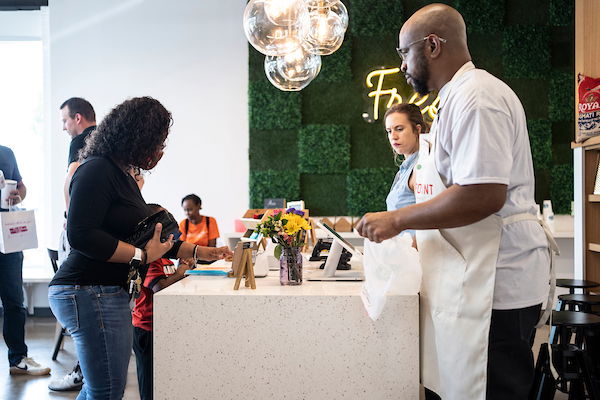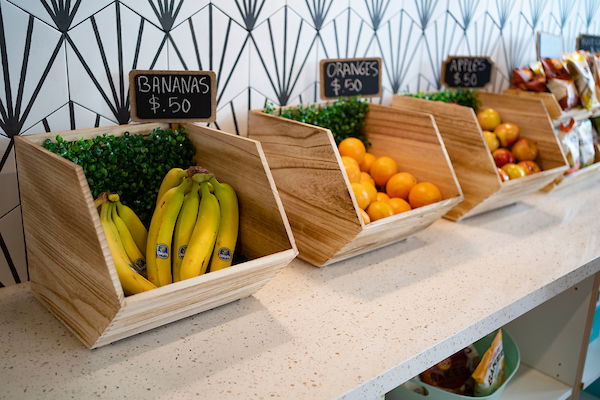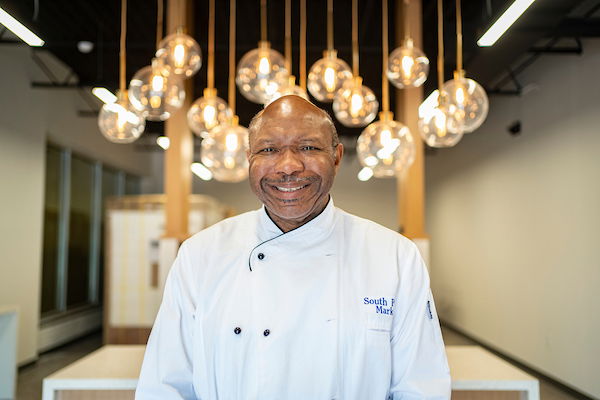“You can do it in one take. OK — ready?”
Perry Eakles, Southpoint Community Market’s store manager, sighs as digital marketing executive Tameca Harris encourages him to sing behind the counter.
“The first one is really simple,” Harris continues as she plays the Ramones’ song on her phone. “All you’re saying is, ‘I believe in miracles!’ ”

Southpoint has been open only for eight months, but the community market’s reels featuring Eakles have made him a TikTok and Instagram celebrity. The short video clips receive more than 13,000 hits a week, according to Harris, who owns Pretty In Branding.
“That means that there are thousands of people who are seeing the reels,” Harris explains. “They are seeing the videos and they will come to see us.”
Southpoint is proving to be a miracle in this sparsely populated South Dallas neighborhood between Al Lipscomb and Martin Luther King Jr. boulevards. Access to healthy, affordable food has been among the top concerns for residents here. The closest grocery store is a Fiesta that’s more than a mile away, and residents say the nearby convenience stores are expensive and don’t have fresh produce. The average income per person in this census tract is $16,000 a year, and that made it difficult to attract big box stores to set up shop.
And yet, Cornerstone Baptist Church, with funding from The Real Estate Council, has found a way to create a non-profit grocery store that may be a replicable model for other low-income “food deserts.”
Neighborhood residents stroll in and out of this petite, upscale-design venue carrying more than one shopping bag. With more customers, Eakles says the store already has expanded its hours and is open on more days. It launched last June with a Thursday through Saturday schedule, and now is open Wednesday through Sunday.
“Wednesday is one of our busiest days because people are waiting for the market to open,” Eakles says. “Yesterday [Wednesday] we did really well. More people in the neighborhood are coming in now.”
Eakles says Southpoint makes between $500 to $700 in sales a day. In their opening month, they sold about $1,500 in goods. In December, they sold more than $13,000.
“Really we are not in it to make a profit,” Eakles says. “We are in it to help our people save money. We have low prices.”
Eakles points to bleach for 50 cents, soft drinks for 50 cents, canned goods for a dollar and fresh fruits and vegetables like pears, lemons, apples, bananas, potatoes and ginger for less than a dollar.
“If you have $5, you can walk out of the store with three bags of stuff,” he says.
The market has three full-time employees, including Eakles, who are responsible for everything from working behind the register, keeping up with inventory and keeping the store clean. Between salaries, utility costs and purchasing products to stock the shelves, the market spends $250 to $300 a day. Cornerstone’s pastor, Chris Simmons, says any profits above operating costs go back into the market, often to discount healthy foods.
“What we know is that a lot of people purchase unhealthy items because unhealthy items are often cheaper than healthy items,” Simmons says. “So, our vision is to provide healthy items at junk food prices.”
While changing habits can take time, customers are taking baby steps towards healthier purchases. A woman strolled through the store buying chips and packaged snacks, but at the cashier’s counter added a couple of bananas to her basket when she saw the 50-cent price tag.

“We try to discount the fresh fruits and vegetables in particular so people would be more apt to purchase those items,” Simmons says.
Typically, grocers like Target, Walmart and Kroger have large truck deliveries from suppliers multiple times a week. Southpoint doesn’t have the volume to work with large grocery store suppliers, so Simmons says they search online and in newspapers for low prices.
“We do search the sales papers to see where we can get the items that are requested by the community for the cheapest price, and then pass that savings on to the community,” Simmons says.
Eakles says they buy most of the produce and household items from Sam’s, Dollar Tree and Family Dollar. They shop three times a week to make sure the fruits and vegetables are fresh. They also take donations.

The store does not carry much meat, but during the holidays, Eakles says he bought ham, turkey, Cornish hen and duck. He says if he paid $10 at the store, he would discount the items at Southpoint for $2 or $3 less.
Volunteers also help to keep prices affordable, Eakles says. They help with inventory, cleaning and store operations. He says they would need three to four more employees if they didn’t have reliable volunteers.
“Our vision is to create a model that can be replicated,” Simmons says. And he thinks churches can lead the effort by using their buildings and empty Sunday school classrooms to set up a market a couple of days a week. “They can go to farmer’s markets and often get discounts on fresh fruits and vegetables. They can watch sale papers and purchase items at a reasonable cost.”
Churches often have food pantries that give away free items, but Simmons says it’s important for people to pay for their goods.
“Although people have limited income, everybody does not want a handout,” Simmons says. “Freedom of choice is what they want. It has created dignity for those in the community.”
Another reason Simmons believes churches could help create non-profit grocery stores is because they are already doing community outreach and have strong relationships with neighborhood residents. For example, during the holidays Cornerstone provides gift bags to their unhoused neighbors. This year, the Walmart gift cards were replaced with Southpoint gift cards.
“Rich or poor, everybody has to eat,” Simmons says. And, Southpoint is anchoring this community. “In communities like this, there are very few safe havens where individuals can just go and visit with their neighbors. We have that here.”
Simmons says they have received some interest from people hoping to replicate this model, but no one has followed through, and it might be because of start-up costs. The Real Estate Council Foundation put up the initial $480,000 to renovate the space that Southpoint occupies. They also added another $280,000 in in-kind contributions. The City of Dallas’ Economic Development Office will reimburse TREC $390,000 once Southpoint reaches the financial expectations outlined in the proposal.

A resident in the neighborhood walks into the store. He doesn’t buy anything, but laughs and talks with Eakles and the volunteer cashier. Eakles says that’s his favorite part of working in the store.
“We have tables where you can sit and relax and take some pressure off of your mind,” he says. “This is a tough neighborhood. You never know what someone is going through.”
As for being the star of the TikTok videos, Eakles gets a little bashful.
“At the end of the day, it’s all about having fun,” he says. “It’s just another way to get the word out and let people know that there’s something great going on in your neighborhood.”
This story is part of a project on potential solutions to food insecurity in South Dallas and West Dallas, with support from the Solutions Journalism Network. Sujata Dand can be reached at sujata@dallasfreepress.com.

Leave a Reply